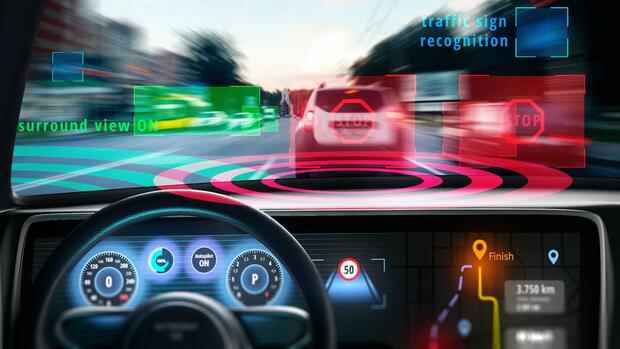Dusseldorf The automobile manufacturer Tesla is not only one of the pioneers of electromobility. The Elon Musks group is also one of the innovation leaders in autonomous driving. Tesla is collecting data about a controversial practice: It uses advanced driver assistance systems for testing purposes in registered vehicles, subject to conditions for drivers.
They, in turn, take the misleading, because inaccurate, term “Full Self-Driving” too literally and don’t keep their eyes on the road. Accidents, including fatal ones, were the result again and again.
For Qasar Younis this is irresponsible. “You can’t just go out into the real world and test how an automated driving system behaves if, for example, a person or an animal unexpectedly runs onto the street,” Younis told Handelsblatt.
The 41-year-old American has set up his own business in this field. In 2017 he founded the start-up Applied Intuition together with Peter Ludwig. Its business approach: virtual test drives. “For example, we take a mile of a real test drive and can extend it virtually to over 1000 miles,” says Younis. “For this we take real events and vary them virtually.”
Top jobs of the day
Find the best jobs now and
be notified by email.
Automated driving systems are based on algorithms that take over the driving decisions. These algorithms make decisions based on the data provided by sensors such as cameras, radars and lidars, i.e. laser radars. Car manufacturers have to train these algorithms. To do this, driving data must be collected and evaluated.
The founder’s US start-up Applied Intuition uses virtual data to train driver assistance system algorithms.
(Photo: Applied Intuition)
Applied Intuition promises to speed up this expensive and time-consuming process with the help of virtual test drives. In this way, not only can the quantity of driving data be increased at low cost, but also its quality, says the founder.
With Younis’ solution, the so-called “edge cases” can also be simulated. These are rare and often dangerous driving situations. Those in which the algorithms of driver assistance systems, such as those from Tesla, are overwhelmed.
“The so-called edge cases hardly ever occur in the real test environment. That’s why simulations are so important, because we can virtually recreate these rare driving situations,” says Younis.
Younis’ idea is particularly popular with traditional car manufacturers. Car brands such as Daimler, GM or Toyota, which are among the customers of Applied Intuition, cannot afford a procedure like Tesla when developing driver assistance systems. And most manufacturers already have experience with public reactions, for example when a model is due to be recalled due to safety or quality defects.
Prominent investors
As with many start-ups in the USA that deal with the topic of automated driving, Ludwig and Younis used to work for Google. There they were busy with the car projects of the tech giant. Younis has a degree in mechanical engineering and was also at the University of Konstanz for a short time. He then worked part-time for Bosch and General Motors. About 18 years ago he then continued his education in the software sector, he says. The idea for Applied Intuition came to Younis and Ludwig during their time at Google.
They share the view of the traditional car manufacturers that the road to automated driving will be gradual. The founder explains that the development of robotic taxis, on which companies such as Waymo and Cruise are working, makes sense. But money is currently only earned with driver assistance systems. The car manufacturers and suppliers have their eyes on the costs above all, and Younis promises that these could be reduced with the virtual test drives from Applied Intuition.
That cannot be checked. As is usual for start-ups, Applied Intuition does not publish any company figures. It’s going well, assures Younis. Whether the start-up is in the black remains a secret.
However, the fact that the young company was able to convince well-known venture capitalists speaks for Applied Intuition. Investors Andreessen Horowitz, General Catalyst and Kleiner Perkins are among those involved.
In October of last year, around 175 million US dollars were added. In total, Applied Intuition has already collected 350 million euros. From Germany, the start-up investor Janette zu Fürstenberg has invested with her fund La Famiglia. The advisory board of the start-up also has prominent members. In it sit the former Daimler CEO Dieter Zetsche and the former CEO of General Motors Rick Wagoner.
Applied Intuition seeks proximity to the German automotive industry
The company is now valued at around $3.6 billion. Within a year, Applied Intuition was able to almost triple its enterprise value. This development is one of many indications that the market for automated driving is in flux.
Younis and Ludowig now employ more than 100 people and have offices in Silicon Valley, Detroit, Seoul, Tokyo and Munich. The presence in Germany is probably due to the proximity to important customers in the German automotive industry. The fact that the company’s homepage can be accessed in German should leave no doubt as to which customers Younis has in mind.
Many car manufacturers are currently finalizing the development of systems with which drivers can, for example, drive their vehicles independently on the freeway. Daimler already offers such a system in the S-Class. In two years, cheaper volume models could also be equipped with such systems. Volkswagen has similar plans. The car manufacturers then want to improve their systems step by step.
Younis and Ludwig have no doubts that this path will eventually lead to fully self-driving cars. “I’m sure that there will be fully autonomous robot cars at some point,” says co-founder Ludwig. “But this still requires a number of technological breakthroughs. I am optimistic that this will happen in my lifetime.” And Ludwig is 33 years old.
More: Bosch aims to help make automated driving suitable for the mass market. For Volkswagen it is a paradigm shift in working with suppliers.

